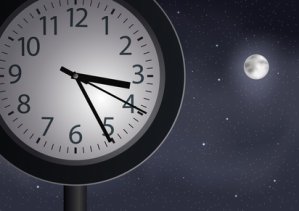Shift work disrupts the body’s sleep-wake cycle and increases your risk of overweight and stroke
 Living in contradiction with the body’s natural sleep-wake cycle may be life-threatening, as shift work reduces the body’s production of melatonin, which controls our sleep pattern and many general physiological processes. However, taking melatonin supplements may compensate for the lowered endogenous production and even for shift work and other disturbances of the body’s sleep-wake cycle.
Living in contradiction with the body’s natural sleep-wake cycle may be life-threatening, as shift work reduces the body’s production of melatonin, which controls our sleep pattern and many general physiological processes. However, taking melatonin supplements may compensate for the lowered endogenous production and even for shift work and other disturbances of the body’s sleep-wake cycle.
More and more people work during the night and have shifting work hours. That makes them more prone to overweight, constipation, gastro-intestinal diseases, cancer, cardiovascular ailments, and stroke. A new study that is published in the journal Endocrinology reveals that men and women respond differently to stroke caused by shift work.
Why shift work disrupts the body’s natural sleep-wake cycle
The body is in sync with the astronomical day and night (24 hours), which means that our biological clock tells us when to be physically active, eat, sleep, go to the toilet etc. Melatonin is a hormone that gets produced in the pineal gland of the brain. It controls our sleep pattern and many other general physiological processes. Exposure to light suppresses the release of melatonin, while darkness steps up the production and causes us to feel tired and go to sleep. Shift work and night work, however, interfere with the natural light exposure and the natural sleep-wake cycle (circadian rhythm), thereby confusing the body in terms of when to feel hungry and tired, digest food, and numerous other physiological processes. This may eventually cause harm to our health.
Overrepresentation of cardiovascular diseasesIt is documented that people with shift work have a 40 percent higher rate of cardiovascular disease, which can be both debilitating and life-threatening. |
Stroke is a common cause of death and disability
Professor David Earnest who is affiliated with the Texas A&M University in the United States has observed that shift work may increase the risk of stroke caused by clogged arteries. In the United States and other parts of the world, stroke is the leading cause of various types of disability and a common cause of death, which occurs as a result of a failing blood supply to the brain.
More severe brain damage and difference between the two sexes
Earnest and his team of researchers discovered that individuals who work shifts sustain more severe brain damage from stroke. They also observed that males and females respond differently to a stroke in terms of how it manifests itself as a result of disturbances in the circadian rhythm. Males with shift work have far more serious consequences of stroke than females.
The scientists assume that differences in the hormone balance may be a determining factor and that estrogen, the female sex hormone, helps the brain deal with stroke. In fact, older menopausal women who produce less estrogen have a greater risk of stroke and serious complications compared to men of similar age.
Social jet lag is widespread
Earnest’s research is specifically relevant for shift workers but also applies to others who work at different times of the day or night and who stay awake at night from time to time and therefore never have a regular sleep-wake cycle. Earnest describes all types of disturbances of the circadian rhythm as “social jet lag” that are a result of the body’s internal clock not being able to keep track.
Health examinations, diet, and other approaches
As shift workers are more prone to overweight, gastro-intestinal diseases, cardiovascular ailments, hypertension, stroke, cancer, and other diseases, they should pay more attention to preventing this from occurring. According to an EU directive, shift workers are entitled to a health examination. In addition, Earnest suggests that anyone with a disrupted sleep pattern should at least make sure to consume healthy main meals and avoid physical inactivity and smoking, which cause damage to the circulatory system.
Melatonin supplements are a natural solution to social jet lag
Shift workers and others who suffer from social jet lag may benefit from taking a melatonin supplement, as this is a natural way of compensating for the body’s decreased melatonin production caused by disturbances in the circadian rhythm.
By taking a melatonin supplement before bedtime you “trick” the body into believing that it is night, even though it is not. That way, melatonin may induce tiredness at all times of the day or night and help you get the natural sleep that is vital for your health, for your productivity, and for your mood. Melatonin is also a powerful antioxidant that benefits the cardiovascular system and counteracts atherosclerosis.
Night work and breast cancerThe Danish Cancer Society has published a study showing that female night shift workers have a 50% overrepresentation of breast cancer compared with women who have work normal hours. The cause is believed to be low levels of melatonin. |
The body’s melatonin production may be disturbed by
|
References:
Texas A&M University. Shift work unwinds body clocks, leading to more severe strokes. 2016
Kræftens Bekæmpelse
Pierpaoli Walter, Regelson William. The Melatonin Miracle. Simon and Schuster 1996
http://www.leksikon.org/art.php?n=2321
Search for more information...
- Created on .








